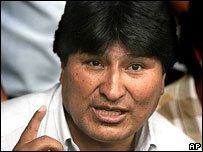In my Latin America module last semester, I wrote an essay about the drug trade. I used the theory of Critical Security Studies (CSS) to analyse the US pursuit of the ‘war on drugs’ in Bolivia.
CSS introduces the concept of ‘securitisation’, whereby issues that are not traditionally considered to be relevant to national security are linked to the security agenda. This has happened with the drug trade (as well as with other issues such as immigration). According to CSS theorist Richard Wyn Jones, securitisation can be used as a means to legitimise the use of certain actions which would be unacceptable in normal circumstances, such as “state-sanctioned killing, suspension of civil rights, confiscation of private resources, and so on“ (1).

Ronald Reagan
In April 1986, in a National Security Decision Directive, US president Ronald Reagan designated the trade in illicit drugs as a security threat to the US. This had a huge impact on many Latin American countries, for whom the policies of their powerful neighbour are an important consideration. A drug certification process was introduced for all states in Latin America. This meant that they had to agree to follow certain counter-drug policies in order to qualify for US financial aid.
These counter-drug policies involve a hardline attitude to the drug trade. They also involve a very militarised approach. Bolivia (along with Columbia and Peru) is one of the three main countries where the coca plant is grown – coca being the basic raw material used in making cocaine. This has meant that the US has taken a strong interest in coca growing in Bolivia.

Coca leaf and cocaine powder
Since the 1980s, there have been very close links between the Bolivian and US security forces. Under US pressure, the Bolivian authorities have pursued an uncompromising, militarised counter-drug policy. The US provides direct funding and training to Bolivia’s Special Drug Police Force (FELCN). In 1984, the US set up a paramilitary force known as the Leopards to eradicate coca production in Bolivia. At least up to 1997, US Drug Enforcement Agency personnel participated in military counter-drug operations on Bolivian soil. Very severe counter-drug legislation in Bolivia was introduced due to US economic pressure, and partly drafted by US legal experts.
These efforts have been mainly focussed on the Chapare region of Bolivia, in the Andean highlands, where most Bolivian coca is grown. The result of this military approach has been a pattern of human rights violations in the area. As of August 2004, there had been 33 deaths and 567 injuries to Chapare coca growers at the hands of the security forces. Arbitrary detention is routine, according to Human Rights Watch. Also, the strengthening of security forces has led to plenty of opportunities for military corruption. The FELCN are closely implicated in this regard (2). We can see how the securitisation of coca has impacted the peasant population of the Chapare.
The security-focussed approach involves a very narrow understanding of the drug trade. It fails to look at the larger context of coca growing in Bolivia. Coca cultivation is seen only as an illegal action which must be prevented, by force if necessary. However, there are social and economic reasons why coca is grown in the Chapare, and a military approach does not address these issues. In the Chapare, there is huge poverty. Most people grow coca because they don’t have many other options. The coca plant is suited to the bad soil and the climate of the area, can be harvested four times a year (more often than most crops), and the profit from sale of coca is much higher than other crops. Also, coca has a cultural significance – it is traditionally used in traditional medicine and religious ceremonies.
Furthermore, these farmers are small players in the wider cocaine trade. The sophisticated networks for marketing and distributing cocaine beyond Bolivia are not Bolivian-owned, and only a very small proportion of cocaine profits accrue to Bolivian coca growers. In 1986, a kilo of coca was worth $1,200 dollars at its source, $7,000 after processing in Colombia, $20,000 upon arrival in Miami, and had an eventual street value of $250,000 (3). It is clear that very little of this profit accrues to the peasant farmers of the Chapare.

Evo Morales
What is really needed is a wider approach that provides economic alternatives to coca. Since the 1980s, Bolivian governments have gone along with US prescriptions on counter-drug policy because of economic pressures. However, in December 2005, Bolivians elected a former coca grower named Evo Morales as president. With Morales in power, it seems that Bolivia is moving away from a simplistic military approach to coca growing, and is starting to look at the social and economic aspects of coca cultivation.
Morales has been advocating a policy of “coca si, cocaina no” (coca yes, cocaine no). He is trying to expand legal markets for coca, and developing production of legal coca products such as tea, biscuits, wine, and cosmetics such as soap and shampoo. Morales has given responsibility for counter drug policy to a former coca grower named
Felipe Caceres, who has declared that the US strategy did not tackle “
the poverty and the social and cultural aspects” of coca growing. This fits in with the CSS suggestion that issues which have been ‘securitised’ should be dealt with by being placed in a wider context, and by turning to more cooperative, non-military solutions. So there is some hope that the issue of coca in Bolivia will be widened beyond a simplistic focus on security. How successful this will be remains to be seen.
Notes:
1. Wyn Jones, Richard; Security, Strategy, and Critical Theory; 1999, p. 108
2. Ledebur, Kathryn; 'Bolivia: Clear Consequences'; in Coletta A Youngers and Eileen Rosin (eds.); Drugs and Democracy in Latin America: The impact of US policy; 2005; p. 153
3. Bewley-Taylor, David; The United States and International Drug Control 1909-1997; 1999, p. 190Labels: Bolivia, CSS, Illegal drug trade, Latin America, US policy



